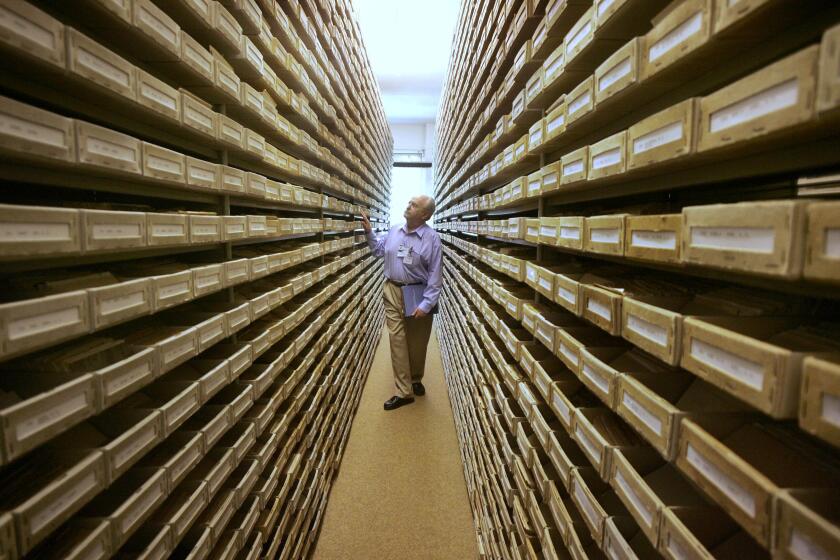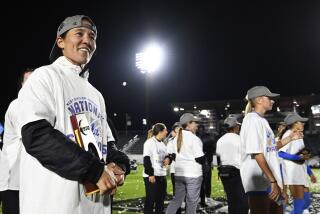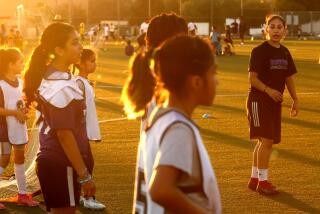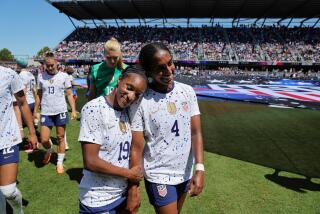George Floyd’s death and the COVID-19 pandemic created learning moments for USC soccer
- Share via
At most colleges, freshmen are to be seen and not heard — especially freshmen like Isabel Rolley, who has yet to play for a USC women’s soccer team that features some of the best players in the country.
Rolley couldn’t stay quiet in the wake of George Floyd’s death beneath the knee of a Minneapolis police officer last spring. So when coach Keidane McAlpine opened a team meeting by asking if anyone had something to share, Rolley, one of four Black players on the team, spoke up.
“I didn’t really know I had a voice,” she said last week. “But the team was really open to it.”
What her words inspired was a series of emotional, often-difficult discussions about race, justice, politics and life that turned a disparate collection of two dozen women into a team, uniting them in ways soccer never could.
“We’ve had some great teaching moments,” McAlpine said. “It’s a wonderful and beautiful thing. If you can’t do it in this collegiate environment, where can you do this? This is supposed to be about education. So we encourage it.
MLS added a new element to talks with its players association on a new CBA by authorizing a lockout if a deal isn’t reached by midnight Thursday.
“Do we always get it right? No. But we’re willing to take the time because at the end, we will all benefit.”
Yet it might never had happened if not for the COVID-19 pandemic that wiped out spring practice, limited the players to online classes and delayed the season nearly six months, pushing the start from the summer of 2020 to this Thursday, when USC kicks off an abbreviated 14-game regular season against Pepperdine.
“It’s like we’re in this space. We can’t control the pandemic, we can’t control the fact that seemingly overnight our entire team lost their spring season,” said Dylan Firsick, a sports psychologist who works with the soccer team.
“It’s allowed us to be in a place where they’ve just had experiences together that they, for sure, would have been unable to have otherwise,” he said.
When spring practice was canceled and players scattered across the country, Firsick said he and McAlpine tried to keep the team together through regular Zoom meetings in which guest speakers delivered inspirational messages and advice for managing life during the pandemic. That changed after the 8-minute 46-second cellphone video of Floyd’s killing went viral, igniting massive Black Lives Matter demonstrations and sparking a nationwide reckoning with racial injustice.
“Our society will benefit from it because hopefully these women will go out and have conversations in their peer groups and in their new working spaces.”
— Keidane McAlpine, USC soccer coach, on discussions his team has had about racism and injustice
“It really created an opportunity for us to examine our culture and invest in our culture from the lens of really exploring racial inequality and oppression,” Firsick said. “We ended up having some really difficult but incredibly fruitful conversations … really confronting some of those dynamics.”
The players shared articles about police brutality, societal privilege and systemic racism, and watched “13th,” an Ava DuVernay documentary about racial inequality in the U.S.
“The intensity of it, that was the part that I think was so beneficial for this team,” Firsick said. “They were really willing to dive in.”
Rolley was among the most passionate participants.
“I had to stop and look at a lot of things,” she said. “We all think we’re in this athlete bubble, but at the end of the day we’re Black before we’re athletes. And that’s what corona[virus] allowed me to figure out and allowed my teammates to kind of take a step back and realize that it’s not just your Black teammates’ problem. It’s everyone’s problem.
“The pandemic was a huge part of that and our team’s new identity.”
Rolley said she was frustrated at first that many white players were unable to understand how racism and societal injustice affected their Black teammates on a daily basis. But then McAlpine, 46, who grew up in Alabama and is one of just a handful of Black coaches in college soccer, spoke up.
“He never took over the discussions. But he introduced the idea,” said Rolley, a member of USC’s United Black Student-Athletes Assn., which includes representatives from all of the school’s sports teams. “I think that’s where the team took a stance.”
Those discussions continued when the players returned to campus in August. McAlpine believes the impact they had will continue after the women leave USC.
“Our society will benefit from it because hopefully these women will go out and have conversations in their peer groups and in their new working spaces,” he said. “We hope that they’re more willing to speak up.”
McAlpine, who is often more teacher than coach, has been down this road before. In 2016 some USC players, motivated by sideline protests in the NFL, wanted to take a knee during the playing of the national anthem at their games. Teammates pushed back, so the coach called a meeting — one that produced tears, anger and a resolution: Some players would kneel before the conference opener but stand before the rest of the games. A team that could have been ripped apart was drawn together, going on to win the program’s second national title.
After the death of George Floyd, the NBA mulled how it could help steer the conversation on racism. Its international players are playing a part.
When Rolley brought up the idea of taking a knee before Thursday’s game at the Coliseum, more than half the team agreed to kneel with her.
“I don’t think it would have been that way without COVID,” she said.
McAlpine agreed.
“I don’t know that had the world been going on as usual that we would have gotten the response that we did,” he said. “But we were all forced to stop, look, listen, hear, witness and move on. Regardless of which way you move, we were forced to have some thought-provoking moments.
“The challenge is once we put this pandemic behind us that we continue to be aware and conscious and hold each other accountable. And that this is not just a fleeting moment because we were all sitting still.”
More to Read
Fight on! Are you a true Trojans fan?
Get our Times of Troy newsletter for USC insights, news and much more.
You may occasionally receive promotional content from the Los Angeles Times.








